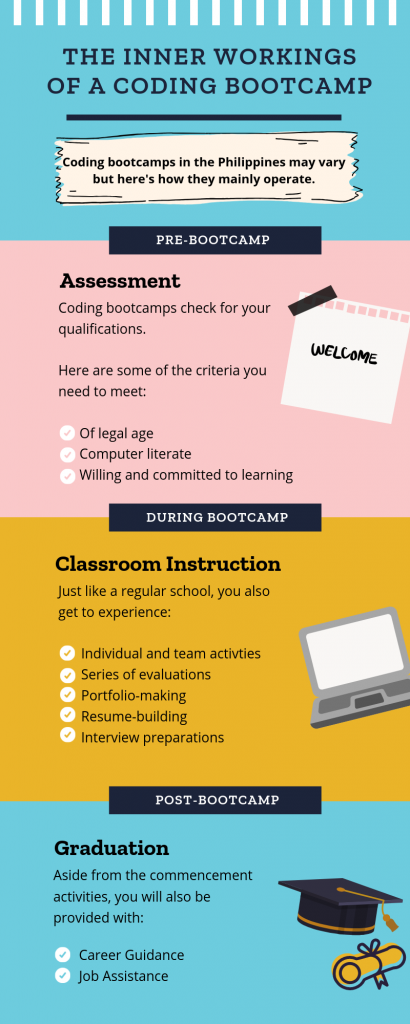In this previous article, we tackled some key differences between a Computer Science Degree vs. Self-studying vs. a Coding Bootcamp. But, the definition of the term “coding bootcamp” wasn’t thoroughly discussed.
Let’s back up a bit and explore the ins and outs of a coding bootcamp.
In a nutshell, coding bootcamps are schools where you learn to code full-time. It’s like a regular school where you go through a brief but intensive training in person. Generally, it runs for a span of 8 to 36 weeks.
Most of these bootcamps are also open to fresh grads, undergrads, non-IT individuals, and career shifters. It’s basically open to everyone who is willing to learn coding.
According to Course Report, these are often referred to as the “fast-track” to well-paying tech jobs. And with lower tuition costs (compared to a four-year Computer Science degree), shorter class times, and an updated curriculum, these alternative education schools are being commended for increasing access to a tech education.
Modern bootcamps kickstarted way back in 2011. In 2018, it was cited that there were 300 coding schools worldwide. And the numbers continue to rise.
It’s a practical venture to go into, especially with today’s demand for tech-related jobs. But, we’ll get to that later. Let’s take a look at its anatomy first.
To illustrate how a coding bootcamp works, take a look at this infographic:

Note: Not all coding bootcamps offer these services so make sure to make in-depth research first. Run a comparative analysis so you can weigh your options.
Should I enroll in a coding bootcamp?

It all boils down to this question: are bootcamps worth it?
Let’s face it. Investing money to pursue a tech-related degree is expensive, especially if you’re pursuing a four-year course. A coding bootcamp can be a solution to this dilemma.
However, the price of bootcamps is no joke either, as you have to invest thousands as well. A whole bootcamp’s worth is approximately equal to only a year’s tuition at a regular school. Not only do you save tons of money, you also get to save a lot of time.
As mentioned earlier, the demand for programmers is high—especially in the Philippines. Yet, the supply does not meet the demand. This results in a higher salary curve among programmers.
As said by Dice.com president Shravan Goli, “As demand for technology professionals rises and highly skilled talent is harder to find, the pressure is being reflected where it counts: paychecks.”
This looks like a huge perk but it’s not always rainbows and butterflies. Though bootcamps only last for months, they would still take up a lot of your time.
Before enrolling, take into consideration these factors first:
- Do they have flexible payment plans?
- For how long will the bootcamp run?
- Is it located near me?
- How are the class schedules?
- Do they offer job hunting assistance?
Now if you’ve found the place that has all the answers to these, then you’re ready to go bootcamping!



